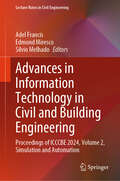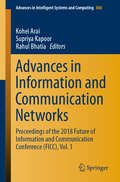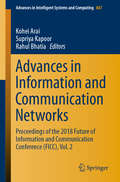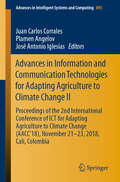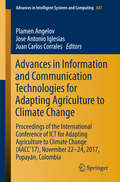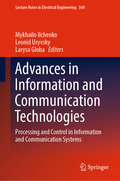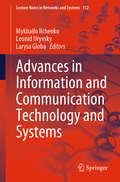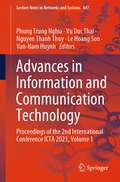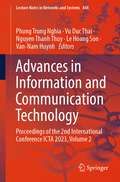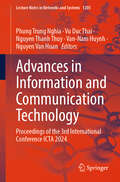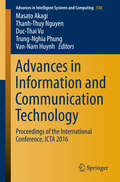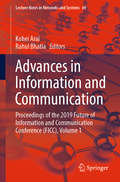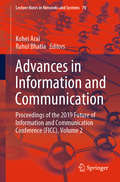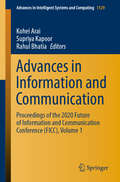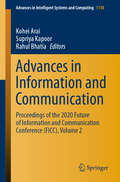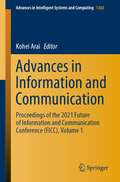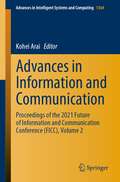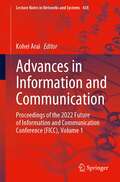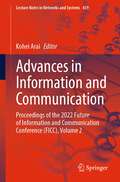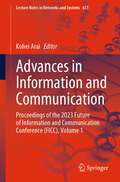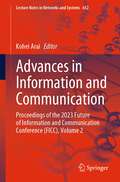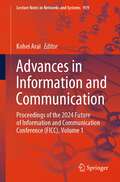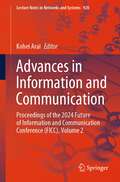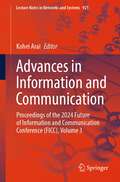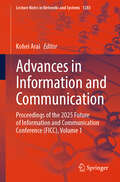- Table View
- List View
Advances in Information Technology in Civil and Building Engineering: Proceedings of ICCCBE 2024, Volume 2, Simulation and Automation (Lecture Notes in Civil Engineering #629)
by Silvio Melhado Adel Francis Edmond MirescoThis book gathers the latest advances, innovations, and applications in the field of information technology in civil and building engineering, presented at the 20th International Conference on Computing in Civil and Building Engineering (ICCCBE), held in Montreal, Canada on August 25-28, 2024. It covers highly diverse topics such as BIM, construction information modeling, knowledge management, GIS, GPS, laser scanning, sensors, monitoring, VR/AR, computer-aided construction, product and process modeling, big data and IoT, cooperative design, mobile computing, simulation, structural health monitoring, computer-aided structural control and analysis, ICT in geotechnical engineering, computational mechanics, asset management, maintenance, urban planning, facility management, and smart cities. Written by leading researchers and engineers, and selected by means of a rigorous international peer-review process, the contributions highlight numerous exciting ideas that will spur novel research directions and foster multidisciplinary collaborations.
Advances in Information and Communication Networks: Proceedings of the 2018 Future of Information and Communication Conference (FICC), Vol. 1 (Advances in Intelligent Systems and Computing #886)
by Kohei Arai Supriya Kapoor Rahul BhatiaThe book, gathering the proceedings of the Future of Information and Communication Conference (FICC) 2018, is a remarkable collection of chapters covering a wide range of topics in areas of information and communication technologies and their applications to the real world. It includes 104 papers and posters by pioneering academic researchers, scientists, industrial engineers, and students from all around the world, which contribute to our understanding of relevant trends of current research on communication, data science, ambient intelligence, networking, computing, security and Internet of Things. This book collects state of the art chapters on all aspects of information science and communication technologies, from classical to intelligent, and covers both theory and applications of the latest technologies and methodologies. Presenting state-of-the-art intelligent methods and techniques for solving real-world problems along with a vision of the future research, this book is an interesting and useful resource.
Advances in Information and Communication Networks: Proceedings of the 2018 Future of Information and Communication Conference (FICC), Vol. 2 (Advances in Intelligent Systems and Computing #887)
by Kohei Arai Supriya Kapoor Rahul BhatiaThe book, gathering the proceedings of the Future of Information and Communication Conference (FICC) 2018, is a remarkable collection of chapters covering a wide range of topics in areas of information and communication technologies and their applications to the real world. It includes 104 papers and posters by pioneering academic researchers, scientists, industrial engineers, and students from all around the world, which contribute to our understanding of relevant trends of current research on communication, data science, ambient intelligence, networking, computing, security and Internet of Things. This book collects state of the art chapters on all aspects of information science and communication technologies, from classical to intelligent, and covers both theory and applications of the latest technologies and methodologies. Presenting state-of-the-art intelligent methods and techniques for solving real-world problems along with a vision of the future research, this book is an interesting and useful resource.
Advances in Information and Communication Technologies for Adapting Agriculture to Climate Change II: Proceedings of the 2nd International Conference of ICT for Adapting Agriculture to Climate Change (AACC'18), November 21-23, 2018, Cali, Colombia (Advances in Intelligent Systems and Computing #893)
by Plamen Angelov Juan Carlos Corrales José Antonio IglesiasThis book presents novel communication technology solutions to address the effects of climate change and climate variability on agriculture, with a particular focus on those that increase agricultural production. It discusses decision support and early warning systems for agriculture; information technology (IT) supporting sustainable water management and land cover dynamics; predictive of crop production models; and software applications for reducing the effects of diseases and pests on crops. Further topics include the real-time monitoring of weather conditions and water quality, as well as food security issues. Featuring the proceedings of the International Conference of ICT for Adapting Agriculture to Climate Change (AACC’18), held on November 21–23, 2018, in Cali, Colombia, the book represents a timely report and a source of new ideas and solutions for both researchers and practitioners active in the agricultural sector around the globe.
Advances in Information and Communication Technologies for Adapting Agriculture to Climate Change: Proceedings of the International Conference of ICT for Adapting Agriculture to Climate Change (AACC'17), November 22-24, 2017, Popayán, Colombia (Advances in Intelligent Systems and Computing #687)
by Plamen Angelov Jose Antonio Iglesias Juan Carlos CorralesThis book presents novel communication technology solutions to address the effects of climate change and climate variability on agriculture, with a particular focus on those that increase agricultural production. It discusses decision support and early warning systems for agriculture; information technology (IT) supporting sustainable water management and land cover dynamics; predictive of crop production models; and software applications for reducing the effects of diseases and pests on crops. Further topics include the real-time monitoring of weather conditions and water quality, as well as food security issues. Featuring the proceedings of the International Conference of ICT for Adapting Agriculture to Climate Change (AACC'17), held on November 22-24, 2017, in Popay#65533;n, Colombia, the book represents a timely report and a source of new ideas and solutions for both researchers and practitioners active in the agricultural sector around the globe.
Advances in Information and Communication Technologies: Processing and Control in Information and Communication Systems (Lecture Notes in Electrical Engineering #560)
by Mykhailo Ilchenko Leonid Uryvsky Larysa GlobaThis book highlights the most important research areas in Information and Telecommunication Technologies as well as Radio Electronics. The respective chapters share in-depth and extended results in these areas with a view to resolving practically relevant and challenging issues including: management services and quality control, improved estimates for reliability indicators, the cryptographic technology Blockchain, research and forecasting of technological characteristics, satellite communications, multiservice transmission systems and effective technological solutions. These results can be used in the implementation of novel systems and to promote the exchange of information in e-societies. Given its scope the book offers a valuable resource for scientists, lecturers, specialists working at enterprises, graduate and undergraduate students who engage with problems in Information and Telecommunication Technologies as well as Radio Electronics.
Advances in Information and Communication Technology and Systems: Processing And Control In Information And Communication Systems (Lecture Notes in Networks and Systems #152)
by Mykhailo Ilchenko Leonid Uryvsky Larysa GlobaThis book highlights the most important research areas in Information and Communication Technologies as well as Radio Electronics, in particular contains publications on theory, applications, and design methods of Processing and Control in Information and Communication Systems. The respective chapters share in-depth and extended results in these areas with a view to resolving practically relevant and challenging issues including: 1. Infocommunications: IT, Cloud and Big Data technologies, E-society, Internet of Things and its implementation, Information and communication systems, security, etc.; 2. Telecommunications: Communication systems and networks, theoretical foundations of information processing and transmission in communication systems, SDN and SDR, etc..; 3. Radio Engineering: Theory of circuits, signals and processes in radio engineering and electronics, Circuit engineering, antennas, Microwave technology, Microwave and THz electronics, etc.; 4. Electronics: Electronic materials, Electronic devices, Nanoelectronics and Nanotechnology, etc. These results can be used in the implementation of novel systems and to promote the exchange of information in e-societies. Given its scope the book offers a valuable resource for scientists, lecturers, specialists working at enterprises, graduate and undergraduate students who engage with problems in Information and Communication Technologies as well as Radio Electronics
Advances in Information and Communication Technology: Proceedings of the 2nd International Conference ICTA 2023, Volume 1 (Lecture Notes in Networks and Systems #847)
by Van-Nam Huynh Le Hoang Son Phung Trung Nghia Vu Duc Thai Nguyen Thanh ThuyThis book contains four keynote abstracts and 83 best peer-reviewed papers selected from the 179 submissions at the 2nd International Conference on Advances in ICT (ICTA 2023), which share research results and practical applications in ICT research and education. Technological changes and digital transformation that have taken place over the past decade have had significant impacts on all economic and social sectors. Information and Communication Technology (ICT) in general and artificial intelligence (AI) in particular have driven socio-economic growth. The topics cover all ICT-related areas and their contributions to socio-economic development, focusing on the most advanced technologies, such as AI. Researchers and practitioners in academia and industry use the books as a valuable reference for their research activities, teaching, learning, and advancing current technologies. The Conference is hosted by Thai Nguyen University of Information and Communication Technology (ICTU).
Advances in Information and Communication Technology: Proceedings of the 2nd International Conference ICTA 2023, Volume 2 (Lecture Notes in Networks and Systems #848)
by Van-Nam Huynh Le Hoang Son Phung Trung Nghia Vu Duc Thai Nguyen Thanh ThuyThis book contains four keynote abstracts and 83 best peer-reviewed papers selected from the 179 submissions at the 2nd International Conference on Advances in ICT (ICTA 2023), which share research results and practical applications in ICT research and education. Technological changes and digital transformation that have taken place over the past decade have had significant impacts on all economic and social sectors. Information and Communication Technology (ICT) in general and artificial intelligence (AI) in particular have driven socio-economic growth. The topics cover all ICT-related areas and their contributions to socio-economic development, focusing on the most advanced technologies, such as AI. Researchers and practitioners in academia and industry use the books as a valuable reference for their research activities, teaching, learning, and advancing current technologies. The Conference is hosted by Thai Nguyen University of Information and Communication Technology (ICTU).
Advances in Information and Communication Technology: Proceedings of the 3rd International Conference ICTA 2024 (Lecture Notes in Networks and Systems #1205)
by Van-Nam Huynh Phung Trung Nghia Vu Duc Thai Nguyen Thanh Thuy Nguyen Van HuanThis book provides a comprehensive overview of cutting-edge research and innovations in Information and Communication Technology (ICT), offering new insights into both theoretical foundations and practical applications. The book contains two keynote abstracts and 115 best peer-reviewed papers selected from the 211 submissions at the 3rd International Conference on Advances in ICT (ICTA 2024), which share research results and practical applications in ICT research and education. The topics cover all ICT-related areas and their contributions to socio-economic development, focusing on the most advanced technologies, such as AI. Researchers and practitioners in academia and industry can use the book as a valuable reference for their research activities, teaching, learning and advancing current technologies. The conference is hosted by Hung Vuong University (HVU) with primary organizing support from Thai Nguyen University of Information and Communication Technology (ICTU).
Advances in Information and Communication Technology: Proceedings of the International Conference, ICTA 2016 (Advances in Intelligent Systems and Computing #538)
by Van-Nam Huynh Masato Akagi Thanh-Thuy Nguyen Duc-Thai Vu Trung-Nghia PhungThis book features papers presented at the International Conference on Advances in Information and Communication Technology (ICTA 2016), which was held in Thai Nguyen city, Vietnam, from December 1 to 13, 2016. The conference was jointly organized by Thai Nguyen University of Information and Communication Technology (ICTU), the Institute of Information Technology - Vietnam Academy of Science and Technology (IoIT), Feng Chia University, Taiwan (FCU), the Japan Advanced Institute of Science and Technology (JAIST) and the National Chung Cheng University, Taiwan (CCU) with the aim of bringing together researchers, academics, practitioners and students to not only share research results and practical applications but also to foster collaboration in information and communication technology research and education. The book includes the 66 best peer-reviewed papers, selected from the 150 submissions received.
Advances in Information and Communication: Proceedings of the 2019 Future of Information and Communication Conference (FICC), Volume 1 (Advances in Intelligent Systems and Computing #69)
by Kohei Arai Rahul Bhatia<p>This book presents a remarkable collection of chapters that cover a wide range of topics in the areas of information and communication technologies and their real-world applications. It gathers the Proceedings of the Future of Information and Communication Conference 2019 (FICC 2019), held in San Francisco, USA from March 14 to 15, 2019. The conference attracted a total of 462 submissions from pioneering researchers, scientists, industrial engineers, and students from all around the world. Following a double-blind peer review process, 160 submissions (including 15 poster papers) were ultimately selected for inclusion in these proceedings. <p>The papers highlight relevant trends in, and the latest research on: Communication, Data Science, Ambient Intelligence, Networking, Computing, Security, and the Internet of Things. Further, they address all aspects of Information Science and communication technologies, from classical to intelligent, and both the theory and applications of the latest technologies and methodologies. <p>Gathering chapters that discuss state-of-the-art intelligent methods and techniques for solving real-world problems, along with future research directions, the book represents both an interesting read and a valuable asset.</p>
Advances in Information and Communication: Proceedings of the 2019 Future of Information and Communication Conference (FICC), Volume 2 (Advances in Intelligent Systems and Computing #70)
by Kohei Arai Rahul Bhatia<p>This book presents a remarkable collection of chapters that cover a wide range of topics in the areas of information and communication technologies and their real-world applications. It gathers the Proceedings of the Future of Information and Communication Conference 2019 (FICC 2019), held in San Francisco, USA from March 14 to 15, 2019. The conference attracted a total of 462 submissions from pioneering researchers, scientists, industrial engineers, and students from all around the world. Following a double-blind peer review process, 160 submissions (including 15 poster papers) were ultimately selected for inclusion in these proceedings. <p>The papers highlight relevant trends in, and the latest research on: Communication, Data Science, Ambient Intelligence, Networking, Computing, Security, and the Internet of Things. Further, they address all aspects of Information Science and communication technologies, from classical to intelligent, and both the theory and applications of the latest technologies and methodologies. <p>Gathering chapters that discuss state-of-the-art intelligent methods and techniques for solving real-world problems, along with future research directions, the book represents both an interesting read and a valuable asset.</p>
Advances in Information and Communication: Proceedings of the 2020 Future of Information and Communication Conference (FICC), Volume 1 (Advances in Intelligent Systems and Computing #1129)
by Kohei Arai Supriya Kapoor Rahul BhatiaThis book presents high-quality research on the concepts and developments in the field of information and communication technologies, and their applications. It features 134 rigorously selected papers (including 10 poster papers) from the Future of Information and Communication Conference 2020 (FICC 2020), held in San Francisco, USA, from March 5 to 6, 2020, addressing state-of-the-art intelligent methods and techniques for solving real-world problems along with a vision of future researchDiscussing various aspects of communication, data science, ambient intelligence, networking, computing, security and Internet of Things, the book offers researchers, scientists, industrial engineers and students valuable insights into the current research and next generation information science and communication technologies.
Advances in Information and Communication: Proceedings of the 2020 Future of Information and Communication Conference (FICC), Volume 2 (Advances in Intelligent Systems and Computing #1130)
by Kohei Arai Supriya Kapoor Rahul BhatiaThis book presents high-quality research on the concepts and developments in the field of information and communication technologies, and their applications. It features 134 rigorously selected papers (including 10 poster papers) from the Future of Information and Communication Conference 2020 (FICC 2020), held in San Francisco, USA, from March 5 to 6, 2020, addressing state-of-the-art intelligent methods and techniques for solving real-world problems along with a vision of future research.Discussing various aspects of communication, data science, ambient intelligence, networking, computing, security and Internet of Things, the book offers researchers, scientists, industrial engineers and students valuable insights into the current research and next generation information science and communication technologies.
Advances in Information and Communication: Proceedings of the 2021 Future of Information and Communication Conference (FICC), Volume 1 (Advances in Intelligent Systems and Computing #1363)
by Kohei AraiThis book aims to provide an international forum for scholarly researchers, practitioners and academic communities to explore the role of information and communication technologies and its applications in technical and scholarly development. The conference attracted a total of 464 submissions, of which 152 submissions (including 4 poster papers) have been selected after a double-blind review process. Academic pioneering researchers, scientists, industrial engineers and students will find this series useful to gain insight into the current research and next-generation information science and communication technologies.This book discusses the aspects of communication, data science, ambient intelligence, networking, computing, security and Internet of things, from classical to intelligent scope. The authors hope that readers find the volume interesting and valuable; it gathers chapters addressing state-of-the-art intelligent methods and techniques for solving real-world problems along with a vision of the future research.
Advances in Information and Communication: Proceedings of the 2021 Future of Information and Communication Conference (FICC), Volume 2 (Advances in Intelligent Systems and Computing #1364)
by Kohei AraiThis book aims to provide an international forum for scholarly researchers, practitioners and academic communities to explore the role of information and communication technologies and its applications in technical and scholarly development. The conference attracted a total of 464 submissions, of which 152 submissions (including 4 poster papers) have been selected after a double-blind review process. Academic pioneering researchers, scientists, industrial engineers and students will find this series useful to gain insight into the current research and next-generation information science and communication technologies.This book discusses the aspects of communication, data science, ambient intelligence, networking, computing, security and Internet of things, from classical to intelligent scope.The authors hope that readers find the volume interesting and valuable; it gathers chapters addressing tate-of-the-art intelligent methods and techniques for solving real-world problems along with a vision of the future research.
Advances in Information and Communication: Proceedings of the 2022 Future of Information and Communication Conference (FICC), Volume 1 (Lecture Notes in Networks and Systems #438)
by Kohei AraiThe book “Advances in Information and Communication Networks - Proceedings of the 2022 Future of Information and Communication Conference (FICC)” aims in presenting the latest research advances, sharing expert knowledge and exchanging ideas with the common goal of shaping the future of Information and Communication. The conference attracted 402 submissions, of which, 131 submissions (including six poster papers) have been selected through a double-blind review process by an international panel of expert referees. This book discusses on aspects of Communication, Data Science, Ambient Intelligence, Networking, Computing, Security and Internet of Things, from classical to intelligent scope. The intention is to help academic pioneering researchers, scientists, industrial engineers, and students become familiar with and stay abreast of the ever-changing technology surrounding their industry. We hope that readers find the volume interesting and valuable; it gathers chapters addressing state-of-the-art intelligent methods and techniques for solving real world problems along with a vision of the future research.
Advances in Information and Communication: Proceedings of the 2022 Future of Information and Communication Conference (FICC), Volume 2 (Lecture Notes in Networks and Systems #439)
by Kohei AraiThe book “Advances in Information and Communication Networks - Proceedings of the 2022 Future of Information and Communication Conference (FICC)” aims in presenting the latest research advances, sharing expert knowledge and exchanging ideas with the common goal of shaping the future of Information and Communication. The conference attracted 402 submissions, of which, 131 submissions (including six poster papers) have been selected through a double-blind review process by an international panel of expert referees. This book discusses on aspects of Communication, Data Science, Ambient Intelligence, Networking, Computing, Security and Internet of Things, from classical to intelligent scope. The intention is to help academic pioneering researchers, scientists, industrial engineers, and students become familiar with and stay abreast of the ever-changing technology surrounding their industry. We hope that readers find the volume interesting and valuable; it gathers chapters addressing state-of-the-art intelligent methods and techniques for solving real world problems along with a vision of the future research.
Advances in Information and Communication: Proceedings of the 2023 Future of Information and Communication Conference (FICC), Volume 1 (Lecture Notes in Networks and Systems #651)
by Kohei AraiThis book gathers the proceedings of the eighth Future of Information and Computing Conference, which was held successfully in virtual mode. It received a total of 369 paper submissions from renowned and budding scholars, academics, and distinguished members of the industry. The topics fanned across various fields involving computing, Internet of Things, data science, and artificial intelligence.Learned scholars from all walks of life assembled under one roof to share their unique, original, and breakthrough researches and paved a new technological path for the world. Many of the studies seek to change the face of the world itself. Their innovative thinking indeed aims to solve several gruesome problems in the field of communication, data science, ambient intelligence, networking, computing, security, and privacy.The authors have strived to render valuable pieces of study in this edition and hope to acquire enthusiastic support from the readers.
Advances in Information and Communication: Proceedings of the 2023 Future of Information and Communication Conference (FICC), Volume 2 (Lecture Notes in Networks and Systems #652)
by Kohei AraiThis book gathers the proceedings of the eighth Future of Information and Computing Conference, which was held successfully in virtual mode. It received a total of 369 paper submissions from renowned and budding scholars, academics, and distinguished members of the industry. The topics fanned across various fields involving computing, Internet of Things, data science, and artificial intelligence.Learned scholars from all walks of life assembled under one roof to share their unique, original, and breakthrough researches and paved a new technological path for the world. Many of the studies seek to change the face of the world itself. Their innovative thinking indeed aims to solve several gruesome problems in the field of communication, data science, ambient intelligence, networking, computing, security, and privacy.The authors have strived to render valuable pieces of study in this edition and hope to acquire enthusiastic support from the readers.
Advances in Information and Communication: Proceedings of the 2024 Future of Information and Communication Conference (FICC), Volume 1 (Lecture Notes in Networks and Systems #919)
by Kohei AraiThe book is a valuable collection of papers presented in the Future of Information and Communications Conference (FICC), conducted by Science and Information Organization on 4–5 April 2024 in Berlin. It received a total of 401 paper submissions out of which 139 are published after careful double-blind peer-review.Renowned and budding scholars, academics, and distinguished members of the industry assembled under one roof to share their breakthrough research providing answers to many complex problems boggling the world. The topics fanned across various fields involving Communication, Data Science, Ambient Intelligence, Networking, Computing, Security, and Privacy.
Advances in Information and Communication: Proceedings of the 2024 Future of Information and Communication Conference (FICC), Volume 2 (Lecture Notes in Networks and Systems #920)
by Kohei AraiThe book is a valuable collection of papers presented in the Future of Information and Communications Conference (FICC), conducted by Science and Information Organization on 4–5 April 2024 in Berlin. It received a total of 401 paper submissions out of which 139 are published after careful double-blind peer-review. Renowned and budding scholars, academics, and distinguished members of the industry assembled under one roof to share their breakthrough research providing answers to many complex problems boggling the world. The topics fanned across various fields involving Communication, Data Science, Ambient Intelligence, Networking, Computing, Security, and Privacy.
Advances in Information and Communication: Proceedings of the 2024 Future of Information and Communication Conference (FICC), Volume 3 (Lecture Notes in Networks and Systems #921)
by Kohei AraiThe book is a valuable collection of papers presented in the Future of Information and Communications Conference (FICC), conducted by Science and Information Organization on 4–5 April 2024 in Berlin. It received a total of 401 paper submissions out of which 139 are published after careful double-blind peer-review. Renowned and budding scholars, academics, and distinguished members of the industry assembled under one roof to share their breakthrough research providing answers to many complex problems boggling the world. The topics fanned across various fields involving Communication, Data Science, Ambient Intelligence, Networking, Computing, Security, and Privacy.
Advances in Information and Communication: Proceedings of the 2025 Future of Information and Communication Conference (FICC), Volume 1 (Lecture Notes in Networks and Systems #1283)
by Kohei AraiThis book comprises the proceedings of the Future of Information and Communication Conference (FICC) 2025, held on 28–29 April 2025 in Berlin, Germany. The conference brought together leading researchers, industry experts, and academics from across the globe to discuss the latest advancements, challenges, and opportunities in the rapidly evolving field of information and communication technologies. The conference received an impressive 401 submissions, of which 138 high-quality papers were selected after a rigorous peer-review process. These contributions span a diverse range of topics, including artificial intelligence, cybersecurity, data science, networking, human-computer interaction, and more. FICC 2025 provided an engaging platform for collaboration and knowledge exchange, highlighting state-of-the-art research and practical solutions to global challenges. This proceedings book serves as a valuable resource for researchers, practitioners, and innovators seeking insights into the future of information and communication technologies.
